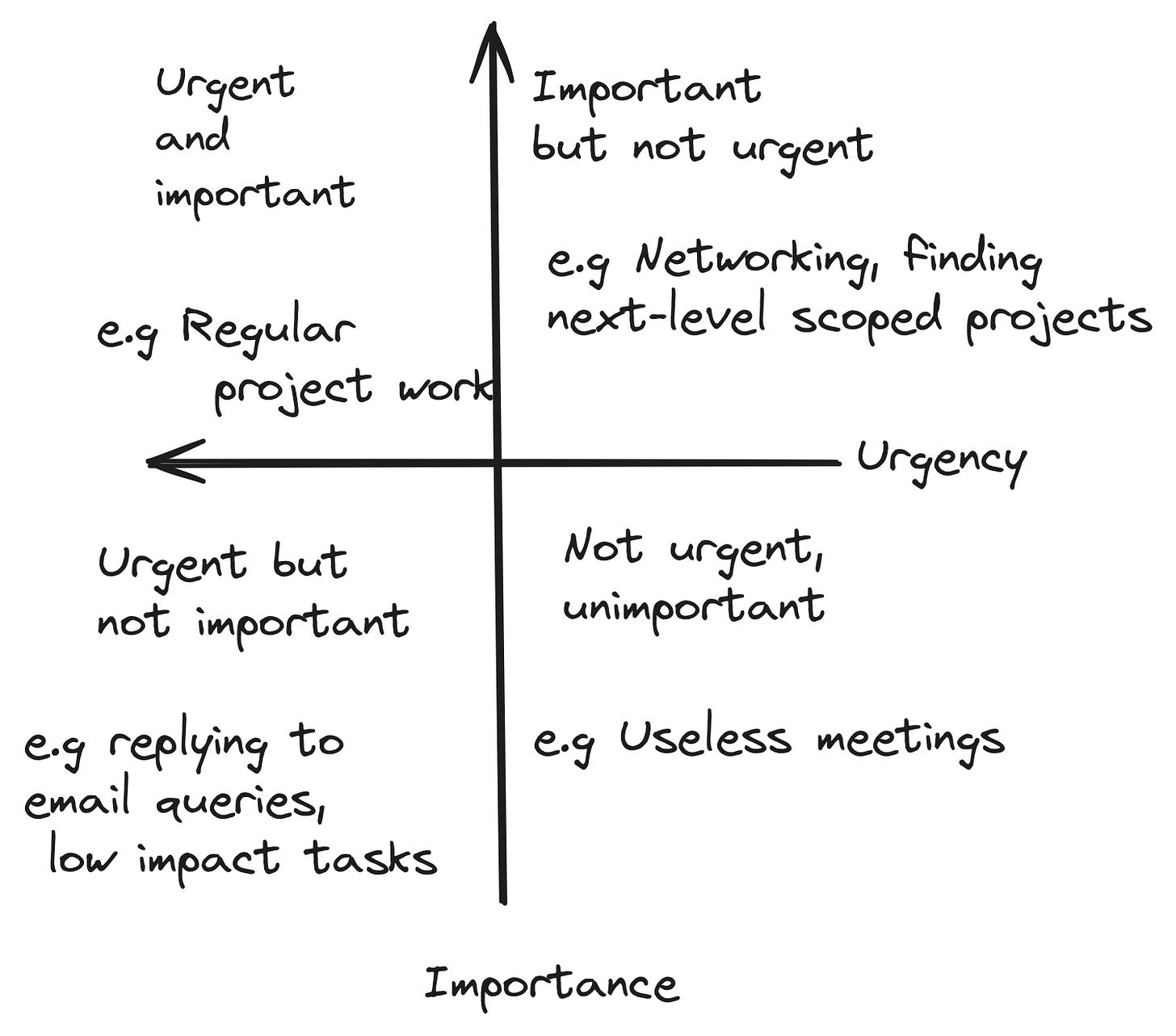When it comes to career growth, you should be in the driver’s seat. No one cares about your career as much as you do. Even the most well-intentioned manager has multiple reports and too many other priorities competing for his attention to be solely focused on your career growth.
I’ve previously spoken about how doing your day job well is unlikely to get you promoted. You need to demonstrate that you’re able to function at the next level in order to be considered for promotion.
This brings us to the question of - how to find the time to do that stretch project when you’re already overwhelmed with your day-to-day deliverables.
In this article I share tips based on the system I personally use for making progress on my stretch goals.
Categorize different types of work
Not every task is created equal. The first step to prioritize the right tasks is to categorize them.
I use the Eisenhower Matrix to categorize my tasks. This concept was introduced by Stephen Covey in his book, The 7 Habits of Highly Effective People. The Eisenhower Matrix groups your tasks into four categories based on their urgency and importance.
An important factor here is identifying when tasks are urgent and when they’re important. When you’re categorizing tasks, remember that you’re doing it from the perspective of your career. For example, your manager’s Eisenhower Matrix might look different from yours, and that’s okay.
Urgent tasks - tasks that need to get done within a certain deadline, or there will be negative consequences.
Important tasks - tasks that don’t have an external deadline, but they will have a significant positive impact on your career. This is where our stretch goals usually live.
Most of us are good at getting the urgent tasks done, but keep postponing the important because our plate is always full with the urgent tasks. We need to find a way to make space for our important tasks by offloading some urgent ones - and we will see how, in the next section.
Make time for the important but not urgent
Let’s go over what to do with each category of tasks with a view to make time for the Important-But-Not-Urgent ones.
Not urgent, unimportant - These are tasks that should be completely taken off your plate. They’re just a waste of time.
Urgent but not important - These need to get done, but not necessarily by you. Discuss with your manager if you can get these off your plate and onto someone else’s. For example, a straightforward feature coding task might not do much for a senior engineer’s career but can be very impactful for a junior engineer.
Urgent and Important - You’re most probably already getting these tasks done. Well done, and continue!
Important but not urgent - Make time for these tasks by scheduling them on your calendar for the immediate future, utilizing the time you freed up by clearing tasks in the Q3 and Q4 categories.
Final touches to make the system work
Work with your manager
Help your manager help you make this system a success.
Communicate with them about dropping the non-urgent, unimportant tasks from your plate, so it doesn’t come as a surprise to them.
Get their help on delegating the urgent but unimportant tasks to other teammates.
If you are overwhelmed with too many important and urgent tasks, get their help to take some of them off your plate so you can make some time on your long term goals.
Honor your calendar
No system will work for you if you keep canceling your stretch goal work and using that time for urgent tasks. If you have to work on urgent tasks (like a prod issue), try rescheduling the stretch goal work for the immediate future rather than canceling the appointment.
Iterate and Improve
Conduct weekly and monthly reviews to schedule stretch goal work. Also use this time to reflect on the past week/month, and see how you can tweak the system to suit you better.
❤️ My favorite things this week
Two of my favorite authors wrote about managing up recently, and I recommend both of their articles 💯:
The Dance Between Getting Managed, Self-Managing, and Managing Up by
and How to manage up as an engineer or a manager byIf you’re into personal development (goal-setting, productivity, well-being etc), check out Dr. Izzy Sealey’s YouTube Channel.




Love the strategies in the article, Bhavana.
I'm curious what planning with the eisenhower matrix looks like for you. Do you do a daily planning session? What tool do you use to organize the tasks? I ask because I've always found eisenhower tracking clunky for me--no good system
Bhavana - I remembered bobby axelrod - https://www.youtube.com/watch?v=3Yt7ngxWv1Y